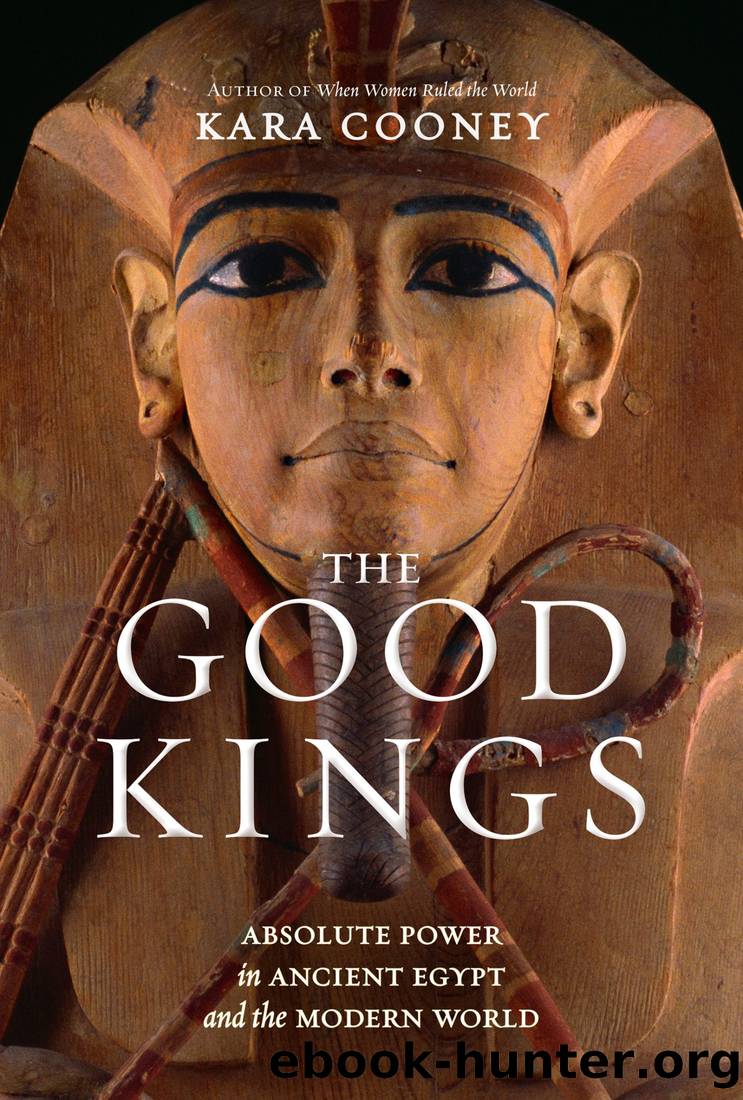The Good Kings: Absolute Power in Ancient Egypt and the Modern World by Kara Cooney

Author:Kara Cooney [Cooney, Kara]
Language: eng
Format: epub
Tags: Biography & Autobiography, Historical, history, Ancient, Egypt, political science, Political Ideologies, Fascism & Totalitarianism
ISBN: 9781426221965
Google: T3hXzgEACAAJ
Publisher: National Geographic Society
Published: 2021-11-02T23:57:41.330262+00:00
ATENISMâS ENDGAME
Even god-fearing kings may live to see their ideas come crashing down around them. In Akhenatenâs unfinished tomb, carved into the rock of his capitalâs eastern necropolis, we see reliefs presumably taken from real life. One shows the king and the royal family grieving, a hand on each head as a sign of mourning. They seem to have been devastated by a great lossâpossibly the untimely death of a young princess. Akhenatenâs new religion would offer nothing much to heal their pain; that part of the ideology hadnât been developed yet. Thus, they had no incantations, no spells, no Osirian intercession: only the positivism of food offerings and grief. Akhenaten had stripped away too much. The only solace was mourning and money.
When Akhenaten himself died, he was placed in a gilded coffin set in a red-granite sarcophagus carved with an Aten sun disk upon it.96 But archaeologists found that stone container smashed into tiny bitsâan indication of the true feelings of his subjects and a testament to how reviled the king had become as a heretic among his own people. His capital city was abandoned; it had been overplanned with single-minded vision and was not sustainable for the organic use of its citizenry. Its statues and reliefs would be left in place, to be obliterated or buried in the ensuing years.97 Seventeen years of such ideology had been enough, his people tell us in their actions. And so the court quickly moved back to the old ways, worshipping many gods, returning to their former towns and villages, and busily populating courtyards in front of sprawling and disorganized temple spaces.
After his death, Egypt may even have lived under the short rule of Akhenatenâs erstwhile co-king, Nefertiti, who possibly ruled alone under the name Ankhkheperure Smenkhkare. The nine-year-old Tutankhaten, possibly Akhenatenâs son, would be crowned as the next king.98 He and his entourage would feel compelled to remove the Aten element from his name and declare his allegiance to the Amun cult of his Theban family by renaming him: Tutankhamun. Everything the child had grown up with had now been rejectedâa confusing reality for a boy god-king, to be sure.
Although Egypt rejected Akhenatenâs Aten religion, the profound political and ideological changes would have long-term repercussions. Akhenatenânot to mention his Great Royal Wife and the later kings associated with this regime, Tutankhamun and Ayâwould be forever reviled in Egyptian history. He would not be included in the monumental king lists, because he was considered an aberrant blip in a long line of good kings. He had held all the power of divine kingship, only to use it to tighten the noose around the necks of his people and paint himself a victimâawakening an insight among Egyptâs elites of the potential fallibility of their king.
Akhenaten started out with ideologies that seemed, at first light, to be beautiful and equalizing, only to use those same belief systems to cruelly control those who did not follow along. In the end, there is not much difference
Download
This site does not store any files on its server. We only index and link to content provided by other sites. Please contact the content providers to delete copyright contents if any and email us, we'll remove relevant links or contents immediately.
Machine Learning at Scale with H2O by Gregory Keys | David Whiting(4313)
Never by Ken Follett(3957)
Harry Potter and the Goblet Of Fire by J.K. Rowling(3858)
Fairy Tale by Stephen King(3399)
Unfinished: A Memoir by Priyanka Chopra Jonas(3391)
The Man Who Died Twice by Richard Osman(3080)
Will by Will Smith(2920)
It Starts With Us (It Ends with Us #2) by Colleen Hoover(2367)
Rationality by Steven Pinker(2366)
Can't Hurt Me: Master Your Mind and Defy the Odds - Clean Edition by David Goggins(2342)
The Dark Hours by Michael Connelly(2310)
The Storyteller by Dave Grohl(2236)
Friends, Lovers, and the Big Terrible Thing by Matthew Perry(2230)
The Dawn of Everything: A New History of Humanity by David Graeber & David Wengrow(2210)
The Becoming by Nora Roberts(2203)
The Stranger in the Lifeboat by Mitch Albom(2123)
Cloud Cuckoo Land by Anthony Doerr(2114)
Love on the Brain by Ali Hazelwood(2078)
Einstein: His Life and Universe by Walter Isaacson(2024)
